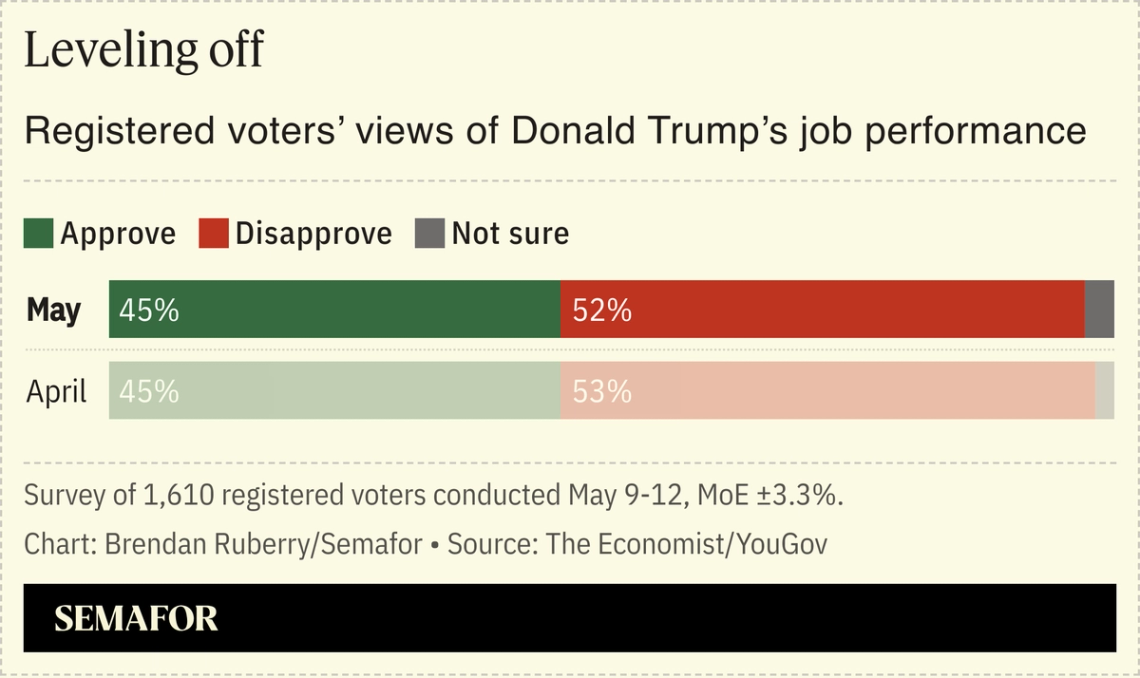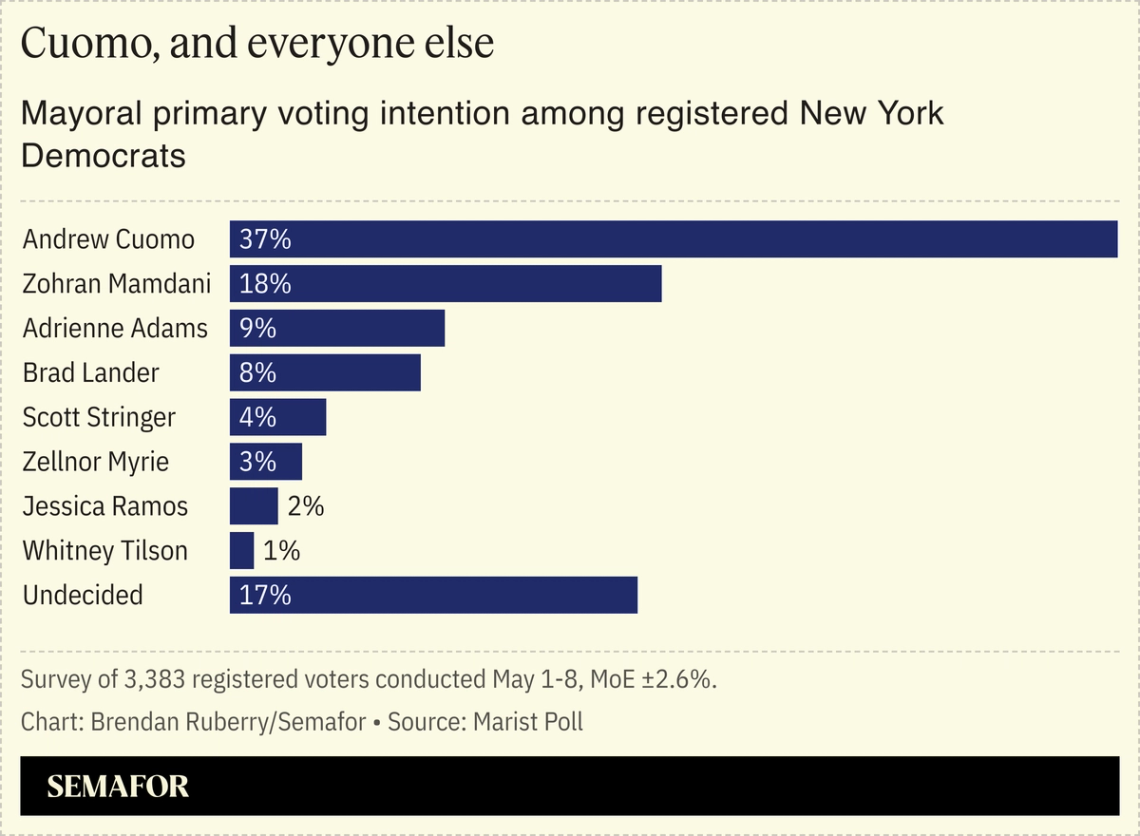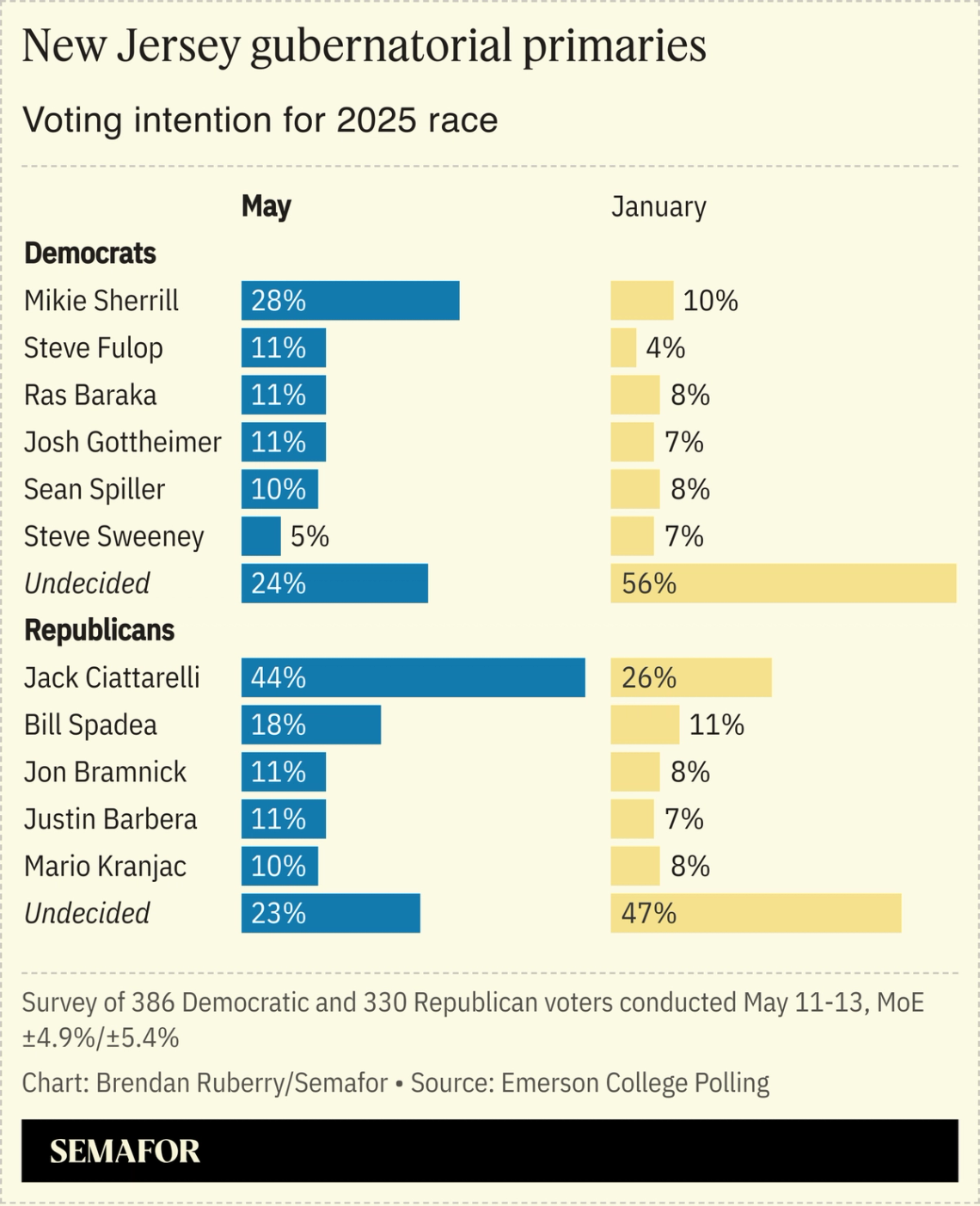 Polls The president’s job approval rating leveled off over the last few weeks, arresting and slightly reversing his post-“Liberation Day” decline. Voters with household incomes above $100,000 drove the number up, shifting from a net -13 approval rating last month to net -2 this month. Those same people drove a small overall bump in support for Trump’s handling of immigration; among these voters, that’s positive by 10 points, a 15-point swing since April. His improvement on “foreign” trade made the same shift, from 20 points underwater to just 7 points. Democrats have argued over whether it’s a mistake to campaign on anything but economic insecurity and tariffs; there’s some evidence here that the economy question, while bad for Trump, is too unpredictable to center in every news cycle.  Every candidate not named “Andrew Cuomo” has spent the last month hammering the former governor, grabbing onto every mistake (botching a public finance requirement, jargon in a policy memo that looked AI-generated) and trying to drive his favorable rating down. Cuomo has a floor, held up by black voters (50% support him) and Latinos (41%). Adrienne Adams, who entered the race when Eric Adams (no relation) quit the primary to run as an independent, gets 14% of the black vote, and white voters are split between Cuomo and Mamdani. There’s promising material for the anti-Cuomo candidates: Three-quarters of voters say they want the next mayor to stand up to Trump, which they say Cuomo won’t be able to do. But the key voters’ impressions of Cuomo are locked into his COVID era, when most Democrats saw him as a leader of anti-Trump resistance.  Taken entirely after Mayor Baraka was arrested outside of a would-be ICE facility in Newark, Emerson’s polling doesn’t find that it moved many votes. What has? TV ads and endorsements. Democrats have moved mostly to Rep. Sherrill or Fulop, the mayor of Jersey City; both went on air early, and Fulop, who got into the race two years ago, has outspent everyone. Primary voters strongly opposed Baraka’s arrest, by a 63-19 margin. But Democratic voters were rattled by the closeness of last year’s presidential election and Gov. Phil Murphy’s 2021 re-election. President Trump is more popular than Murphy right now, 53% of voters say they want the next governor to “work with” the administration; by a 44-38 margin, more voters say they support Baraka’s arrest. Electability-conscious Democrats don’t look ready to reward a candidate whose actions they agree with, but who might not play as well against Ciattarelli, the runaway GOP favorite after he won Trump’s endorsement. Ads Club for Growth Club for Growth- Club for Growth, “Stand Up.” The right’s strange — but strategic — new respect for John Fetterman manifested in this ad, the only one urging a Democrat who’s not in cycle to vote for a Trump tax cut package. The senator “stands up for working families,” and that means he should “extend and expand” the cuts. Fetterman opposed starting debate on the GOP’s budget, and Republicans haven’t been lobbying him on something that can pass without Democratic votes. But there’s a lot of work and some money going into love-bombing Fetterman right now, as progressives make fun of him.
- Ghazala for Virginia, “Taken On.” The Virginia GOP’s choice for lieutenant governor quickly became a problem for his party; the rest of the ticket stopped campaigning with him after he was linked to a salacious Tumblr page, but he took a page from the Donald Trump playbook and blamed the “Richmond swamp” for the scandal. In the crowded Democratic race for the job, candidates are defining themselves against Trump. “Trump’s hate pushed me to run,” state Sen. Ghazala Hashmi says here, in front of an anti-DOGE protest sign, describing her wins in Richmond as bulwarks against the president.
- Stringer NYC, “Hustle.” Four years ago, former New York City Comptroller Scott Stringer’s campaign was hobbled by a #MeToo accusation that he denied; his defamation lawsuit is still working through the courts. This year, his pitch of progressive competence has been crowded out by current comptroller Brad Lander and the excitement around democratic socialist Zohran Mamdani. Stringer’s first ad differentiates him from other progressives with a few campaign promises, like a “cop on every train” and more housing construction on vacant lots — no mention of other candidates and a quick reference to how he’ll fight the “schmuck” in the White House, which is central to some other campaigns.
Scooped!Thirty House Democrats are 75, or older. How many of them will run for re-election this year? Axios’s Andrew Solender had the bright idea of asking them, and found that at least half are committed to seeking a new term, well above the age when many companies require their leaders to retire. “I haven’t started thinking about not doing it,” said Missouri’s Emmanuel Cleaver, who was born shortly before the Battle of the Bulge. The should-Biden-have-quit discourse, which can’t really be resolved, has led to a fascinating, ongoing, open argument about how old is too old to serve. Next - 25 days until primaries in New Jersey
- 32 days until primaries in Virginia
- 39 days until primaries in New York City
- 172 days until off-year elections
- 535 days until the 2026 midterm elections
David RecommendsThe best piece about the Trump administration’s refugee program for Afrikaners was this four-byline New York Times powerhouse, full of history that was obscure until it became important. “Some random person tells him something and he’s obsessed with it,” shrugged John Bolton, recalling how Trump, in his first term, suddenly became interested in rescuing white farmers from South Africa. Most foreign policy hands weren’t paying attention when videos of far-left politician Julius Malema led chants of “kill the Boer,” and Malema’s party actually lost seats last year, when the decline of the African National Congress led to a coalition government with a multi-racial party. But the narrative that got to Trump was that white farmers were being slaughtered, and Afrikaners are now getting into a refugee pipeline that’s been closed to millions of non-white people in war zones. (Read Will Sommer in The Bulwark for more on the arrivals.) |